With the Christmas break fast approaching, some of the departments involved in the research application submission process will be running at reduced capacity. Therefore, we will be accepting applications with an external deadline no earlier than 9th January 2017. Open dated applications can be accepted but please note that they will not be processed before the Christmas break.
Yearly Archives / 2016
HE policy update
Teaching Excellence Framework (TEF) and Research Excellence Framework (REF)
The Vice-Chancellor, Professor John Vinney, has a new blog on the HEPI (the Higher Education policy Institute) website on research and teaching and how REF and the TEF work together, with some proposals for change in how the REF is implemented in 2021, and views on subject level TEF, which is proposed for year 3 (informal consultation has already started).
And on Thursday afternoon the HEFCE REF consultation on the implementation of the REF 2021 was published – with a response date of 17 March 2017. The proposals incorporate the principles from the Stern Review. You can read the background on our BU Policy & Public Affairs page on the Stern Review. Wonkhe have a useful summary of the proposals and David Sweeney from HEFCE has written for Wonkhe on why the sector needs to engage in the consultation – contact policy@bournemouth.ac.uk if you would like to be involved in preparing our response, we will be working on this with RKEO.
Wonkhe have published an interesting analysis of the TEF metrics and benchmarking and how they work complete with data about the current likely outcomes of the TEF. Wonkhe report that Professor John Raftery, vice chancellor for London Metropolitan University, has written for the Telegraph on the TEF, calling for the metrics to include a measure for number of qualified teachers in universities – something BU also called for in our TEF consultation response.
An expert in dyslexia has written a blog for Wonkhe on potential benefits for disabled students as a result of the implementation of the Teaching Excellence Framework with its focus on “split” metrics.
Widening Participation and Social Mobility
A Social Mobility Commission report has been issued looking at social and ethnic inequalities in post-16 choices. It examines social gender and ethnic inequalities.
The report found significant differences between poorer children and wealthier children living in the same neighbourhood with the same GCSE results. This Government press release states that “bright children from poorer backgrounds are far less likely to go to university or study A levels that could get them into top universities than their wealthier counterparts – even if they live in the same neighbourhood and achieve similar results at GCSE.”
Some other key findings include:
- 24% of children eligible for free school meals attend higher education compared to 42% of children from more privileged backgrounds.
- Poorer children are also twice as likely to drop out of education at 16 and are more than half as likely to study A levels that could get them into a top university.
- around a quarter of the progression gap – the different choices made by children after leaving school – is purely down to social background.
- White British students are far less likely to go to university than ethnic minority students – Indian (72%), Pakistani/Bangladeshi (53%), Black (57%) and White British (36%). Participation differences between White British and other ethnic groups who live in the same neighbourhood and with the same GCSE attainment are even more pronounced.
- White British students are more likely to drop out of post-16 education than ethnic minority students – Indian (3%), Pakistani/Bangladeshi (8%), Black (7%) and White British (10%).
- Female pupils are 8% more likely to attend university than males (44% versus 36%). However, although female participation rates at top selective universities are slightly higher (10% versus 9% for boys); they are less likely to attend these universities than a boy from the same neighbourhood with the same GCSEs.
Education Select Committee Inquiry into the effect of Brexit on staff and students in HE
Our evidence has been published as part of 190 submissions to the committee. You can read the submissions through links here (click on “view all”).
Neil Carmichael MP, Chair of the Education Committee, said: “This written evidence from university leaders, academics, businesses and others highlights the degree of concern about the fate of UK universities post-Brexit. The evidence raises a variety of issues relating to freedom of movement, including the prospects for recruiting EU students post-Brexit and the future rights of EU staff to live and work in the UK. Concerns are also raised about how to maintain the UK as an attractive destination for EU and international students, about the financial viability of universities, and the need to ensure Britain can continue to compete on the international stage as a provider of world-class university education.
In our inquiry, we are determined to examine the opportunities for higher education post-Brexit and consider what the Government’s priorities should be for the sector going into the negotiations with the EU. It’s crucial that we don’t allow Brexit to become a catastrophe for our university sector. We look forward to testing the evidence and questioning university leaders, academics, students, unions, and Ministers in our public evidence sessions in the New Year.”
Higher Education and Research Bill reaches the Lords
The HE and Research Bill had its second reading in the House of Lords on 7th December and has now moved to the Lords Committee stage. Research Professional have a summary. You can read the full debate in Hansard here and a summary by DODs here.
At the committee stage amendments will be tabled and discussed in great detail. The Bill has only had government amendments approved so far, and there has been a lot of criticism (of and by everyone) of the level of scrutiny so far – with time being severely limited in committee and third reading stage in the Commons, with all opposition amendments rejected. But as you saw from my update on the third reading in the Commons, the debate there centred largely on Brexit, student visas, TEF, and loans (none of which are actually covered by the Bill), with very little actual focus on the bill itself.
It is expected that the Lords, while they will discuss those issues as well, will also focus on the bill itself, particularly on the changes to the research landscape, but also on degree awarding powers and other aspects of autonomy – and that was reflected in the debate, as well as discussions about the TEF.
UUK have update their briefing note to focus on what they want from the Lords – read it here – it lists the same 7 issues as for the House of Commons third reading, so it is interesting to see that they have flagged three in particular in a joint letter to the Guardian with GuildHE, calling for the Lords to amend the Bill to address probationary degree awarding powers, to stop the OfS validating degrees and to stop the government interfering in academic standards and course funding.
It has long been expected that fees, loans and linking TEF to fees, will be a feature of the Lords debate – Wes Streeting wrote about student loan repayment yesterday: Wes Streeting MP: Labour Lords will fight student loan repayment ‘scandal’.
UCU Survey: Inaccuracies in predicted grades
The UCU undergraduate application and admission survey tackles the disparity between predicted and actual A level grades achieved. It reports only 16% of predictions (2013-15) were correct with the majority of students predicted higher than they achieve, identifies differences in under/over prediction depending on the type of institution, and notes differences surrounding disadvantaged students. The Guardian quotes Sally Hunt (UCU) “this report is a damning indictment of a broken system” and references the underpinning study by Dr Gill Wyness (University College London Institute of Education) “it seems highly inefficient to continue with a system in which life-changing decisions are made, and scarce university places are allocated, on the basis of inaccurate information”. THE pick up on the socio-economic angle of high achieving disadvantaged students who are under predicted and state it may be skewing their access to highly selective universities. UCU are calling for an overhaul and recommend a post-qualification admissions system. .
Something a bit different
The House of Commons Science and Technology Committee has decided to create an open opportunity for the science community and the wider public to suggest science and technology areas for scrutiny. Inquiry: My Science Inquiry
Inquiry proposals will be considered on the basis of merit, and the Committee would be interested to receive proposals for work in areas that might otherwise escape its attention. Proposals should outline in less than 200 words the nature of the issue that the Committee should explore, why it deserves attention, and how Government policy in this area could be developed or improved. A selection of the proposals will be shortlisted for an opportunity to give a 10-minute pitch to the Committee in person at a public ‘Dragons’ Den’-style session to be held in the New Year. Please contact policy@bournemouth.ac.uk if you are interested in contributing – the deadline is 4th January 2017.
Ten Hyperlink Gifts I Love for You at Christmas from Kip Jones
 Links to ten things that I have loved over the past year, from KIPWORLD and from others.
Links to ten things that I have loved over the past year, from KIPWORLD and from others.
Inspiration for me, and hopefully for you.
Season’s best and Happy New Year,
Kip

The Personal Data & Trust Network is seeking new members

The Network aims to build and nurture a community that brings together industry, the public sector, funders, research organisations, individual researchers and innovators to support the UK in becoming the global leader in trust and responsible innovation with personal data.
To find our more click here
Interested in augmented and virtual reality?

Immerse UK is a new cross-sector network for business and research organisations across all part of the UK economy that are interested in the way that augmented and virtual reality can help drive productivity, social and economic growth.
To find out more click here.
To become a member – its free – click here.
Innovate UK launch open funding programme
![InnovateUK_LogoA_Interim_RGBx320govuk[1]](http://blogs.bournemouth.ac.uk/research/files/2014/12/InnovateUK_LogoA_Interim_RGBx320govuk11-300x90.jpg)
Are you working with a business that would be interested in this funding opportunity? Research organisations can participate as project collaborators. (The level of total research participation is set at a maximum of 30% of total eligible project costs.)
UK businesses can apply for a share of up to £15 million to deliver transformational innovations with potential for impact on the UK economy.
The competition is now live and open to the best business-led, innovative or disruptive ideas or concepts. These can be drawn from any technology, engineering or industrial area. This area can be one that fits into, or be outside of, any one or more of Innovate UK’s 4 priority sectors for growth. (Emerging and Enabling Technologies, Health and Life Sciences, Infrastructure Systems, Manufacturing and Materials.)
To be in scope, a proposal must:
- demonstrate transformational or disruptive innovation leading to novel, new products, processes or services
- articulate a clear, anticipated growth and commercialisation impact for the business(es) with considerable, demonstrable (as you would set out in a pitch to any serious investor) potential to lead to a significant return on investment (ROI)
Priority will be given to proposals that are likely to lead to sustainable gains in productivity and/or access to new overseas markets through export-led business growth.
To lead a project you must:
- be a UK-based business
- be a business of any size
- carry out your project in the UK
- work alone or in collaboration with others (businesses, research base and third sector) – this could be BU
For more information click here for:
- Competition brief
- Competition guidance
- About Innovate UK
- Innovate UK Delivery Plan including sector information
or more information on knowledge exchange at BU contact Jayne Codling within RKEO.
EPSRC Science Photo Competition 2016 – deadline 16 December
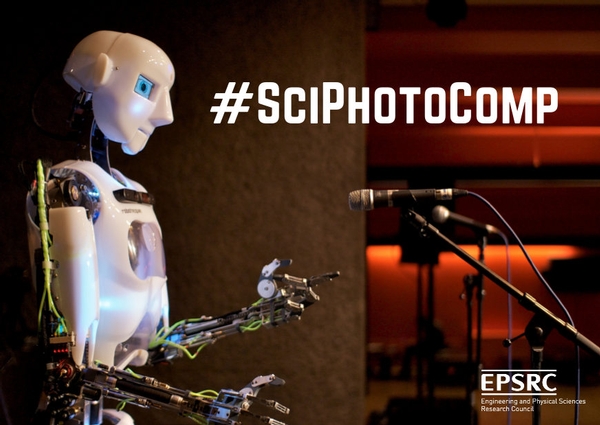
There’s just over a week left to submit entries to the EPSRC’s 2016 Science Photo Competition. They are looking for images that demonstrate research in action. Images can be submitted to any of the following categories:
- Equipment and Facilities: Images of the equipment, facilities and tools used in your research.
- Eureka and Discovery: Images that reflect that Eureka moment or new discoveries and understanding that arise from your research.
- Innovation: Images of research that has inspired innovation or is related to commercial breakthroughs.
- People and Skills: Images of people working as part of your research team, taking part in or affected by your research.
- Weird and Wonderful: Unusual, eye-catching and bizarre images arising from your research.
The competition is open to EPSRC-supported researchers and doctoral students.
For more details and information about how to submit your entry, see the EPSRC’s website.
Higher Education and Research Bill update
The HE and Research Bill had its second reading in the House of Lords yesterday and has now moved to the Lords Committee stage – battle lines were drawn. It was a long debate, but if you weren’t able to watch it or follow the live tweeting, you can read the full debate in Hansard here. At the committee stage (no dates available yet) amendments will be tabled and discussed in great detail.
The Bill has only had government amendments approved so far, and there has been a lot of criticism (of and by everyone) of the level of scrutiny so far – with time being severely limited in committee and third reading stage in the Commons, with all opposition amendments rejected. But as you saw from my update on the third reading in the Commons, the debate there centered largely on Brexit, student visas, TEF, and loans (none of which are actually covered by the Bill), with very little actual focus on the bill itself.
It is expected that the Lords, while they will discuss those issues as well, will also focus on the bill itself, particularly on the changes to the research landscape, but also on degree awarding powers and other aspects of autonomy – and that was reflected yesterday, as well as discussions about the TEF.
UUK have update their briefing note to focus on what they want from the Lords – read it here – it lists the same 7 issues as for the House of Commons third reading, so it is interesting to see that they have flagged three in particular in a joint letter to the Guardian with GuildHE, calling for the Lords to amend the Bill to address probationary degree awarding powers, to stop the OfS validating degrees and to stop the government interfering in academic standards and course funding.
It has long been expected that fees, loans and the linking of TEF to fees, will be a feature of the Lords debate – Wes Streeting wrote about student loan repayment yesterday: Wes Streeting MP: Labour Lords will fight student loan repayment ‘scandal’
History and Biography in the Sociology of Welfare: The importance of student fieldwork
Sociology, as an emerging discipline, developed within the crucible of historical studies of changing lives, transforming events and a search for alternative ways to understand history. We see this in the works of such illustrious progenitors of sociology as Tocqueville, Marx, Durkheim and Weber but it has itself been marginalised, even hidden, as social, political and historical events have unfurled and a turn to biography has displaced the historical. Furthermore, historical sociology has taken something of a battering since John H Goldthorpe decried its relevance towards the end of the last century. However, it is perhaps this railing against the historical which has lent itself to a resurgence through such key figures as Barrington Moore, Charles Tilly, Theda Skocpol and Shmuel Eisenstadt amongst others. But what of its place within contemporary undergraduate sociological education?
In an attempt to introduce today’s BU undergraduates to the important interdisciplinary fusion of the social, the biographical and the historical we have developed an innovative exploration of the histories of social welfare that students take in their second year of full time study. This involves the broad study of social and political welfare initiatives through to the Poor Law, its reform and the implementation of the Welfare State, retrenchment and contemporary attacks on welfare and those who claim benefits. So what? You may say. This is similar to most programmes of study charting welfare policy. However, two specific aspects mark out this module. The first is the assessment, reported elsewhere, which requires groups to explore the experiences of characters in specific historical periods through the construction of a narrative. This allows students to enter into the social and political worlds of individuals in need of social welfare and support.
The second innovative aspect relates to the continuing strands running through our explorations – we take Richard Lachmann’s approach to historical sociology to understand how the present, and future, is contingent on the past. Throughout the course, we examine seemingly inconsequential events leading to change, and why ‘transformative’ events, such as the introduction of the British Welfare State in 1948, occur when they do. Moreover, we embed this learning in a hands-on fieldtrip to the historic market town of Sherborne. Though a visit to the historic St Johns’ (two of them) almshouses, the architecturally stunning abbey, students are exposed to the religious beginnings of charity and alms, the turn to the Parish and the body politic in dispensing poor relief and an appreciation of the overt discrimination between deserving and undeserving. Indeed, they experience that the ‘poor are always with us’ and also they are stratified in society by those with power. As one student stated:
The trip … showed us how throughout history policies have changed, yet some have remained the same as 600 years ago. It made us appreciate and value history more. We learned how the welfare state changed with time to adjust to the environment and the social conditions (war, economic state, health condition of people etc).
The students undertaking this trip have experienced the importance of an historical sociological approach to social welfare policy and application marrying this with the contemporary focus on biography and merging analytic thought, and an appreciation of the affective. This was particularly evident in discussion of the contemporary foodbank provision which religious and lay people undertake to offset some of the hardships experienced by those requiring benefits today:
I also found it interesting how the food bank is run. I think it is so lovely that the people of Sherborne deliver the food bags to the people who cannot come to collect them. I have never heard of anywhere else that does this before and think it shows just how close a community can be and that we should all work together to help each other.
This takes historical sociology into a contemporary arena in which the biographical is included, and offers the students a chance to bring in the personal and to reflect on experiences whilst acknowledging the historical and the structural:
I was really surprised to find out that there are people still living in the alms houses today! I was not expecting that. I found it really interesting how there are still so many similarities to how it was ran when it began to how it is ran now. Before the trip my understanding was that to live in the alms houses wouldn’t have been a nice experience but from the trip I was able to understand that it was actually built with the intention to help people and that is exactly what it did and still does today. I made connections with the histories of social policy and welfare when I understood that the people who came to live in the alms houses were the ‘deserving poor’.
Jonathan Parker (Department of Social Sciences and Social Work), Nezhat Habib and Bonnie Brown (students on BA Sociology and Social Policy programme)
Publish Open Access in Springer Journals for Free!
 BU has an agreement with Springer which enables its authors to publish articles open access in one of the Springer Open Choice journals at no additional cost.
BU has an agreement with Springer which enables its authors to publish articles open access in one of the Springer Open Choice journals at no additional cost.
There are hundreds of titles included in this agreement, some of which are – Hydrobiologia, European Journal of Nutrition, Annals of Biomedical Engineering, Climatic Change, Marine Biology and the Journal of Business Ethics. A full list of the journals included can be found here
To make sure that your article is covered by this new agreement, when your article has been accepted for publication, Springer will ask you to confirm the following:
- My article has been accepted by an Open Choice eligible journal
- I am the corresponding author (please use your institutional email address not your personal one)
- I am affiliated with an eligible UK institution (select your institutions name)
- My article matches one of these types: OriginalPaper, ReviewPaper, BriefCommunication or ContinuingEducation
Springer will then verify these details with us and then your article will be made available in open access with a CC BY licence.
Please note that 30 Open Choice journals are not included in this agreement as they do not offer CC BY licensing.
If you have any questions about the agreement or the process, please contact OpenAccess@bournemouth.ac.uk
Centre for Midwifery, Maternity and Perinatal Health (CMMPH) represented at the 5th European Midwives Association Education Conference
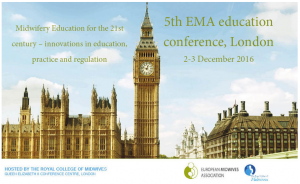
The CMMPH was well represented at the above international conference highlighting innovations in education, practice and regulation. The conference was held this year in London and attended by HRH The Princess Royal. Presentations from CMMPH colleagues ranged from developing a common framework for assessing practice and innovative on-line education approaches, to dignity and care in pregnancy and childbirth and how evidence is utilised in practice.
Presentations (oral and poster) include:
- i) Grading Practice: A common framework to aid consistency and parity across midwifery education programmes in the UK, Fisher M and Way S
- ii) Dignity and care in pregnancy and childbirth: Educating student midwives, Hall J and Mitchell M I
- ii) The BRIEF randomised trial: do Cochrane summaries help midwifery students understand the findings of Cochrane systematic reviews? Alderdice, F and Hundley, V
- iv) UUPP study: Updating the understanding of perineal practice at the time of birth across the UK, Stride, S, Hundley, V, and Way, S.
- v) Promoting physiological birth in Malta: reflection on an educational project. Poster, Hall J and with three midwifery colleagues from Mater Dei Hospital, Malta
- vi) Not just ticking the boxes: online practice assessment in midwifery. Poster, Angell, C. Wilkins, C., Leamon, J. and Way, S.
Other research that is currently ongoing at BU, but was highlighted at the conference was the Interim report of the Human Rights & Dignity Experience of Disabled Women during Pregnancy, Childbirth and Early Parenting. Hall, J., Collins, B., Ireland, J. and Hundley, V.
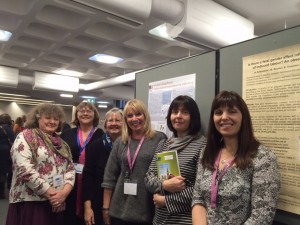
The photo is of (L-R) Jenny Hall, Sara Stride, Sue Way, Carol Wilkins, Catherine Angell and Vanora Hundley.
BU ADGE to chair ASEAN region conference

Associate Dean (Global Engagement) in the Faculty of Media and Communication, Professor Guy Starkey, has been invited to be Programme Chair of the JMComm 2017 conference in October in Singapore. The call for papers has just been published, and you can find it below.
***
Call for papers for the Global Science and Technology Forum’s 6th Annual International Conference on Journalism & Mass Communications (JMComm 2017). The conference will take place from 9th – 10th October 2017 in Singapore.
Past contributors have included scholars from Europe, the Americas, Australasia, Africa and elsewhere. Accepted papers will be considered for publication.
The paper submission deadline is 8th May 2017. The call is now open at http://www.jmcomm.org/call-for-papers/en/cfp.html
***
Guy would be grateful if you could help disseminate the JMComm 2017 call for papers through your own networks. For ANY inquiries, please email secretariat@jmcomm.org
Four new FHSS publications
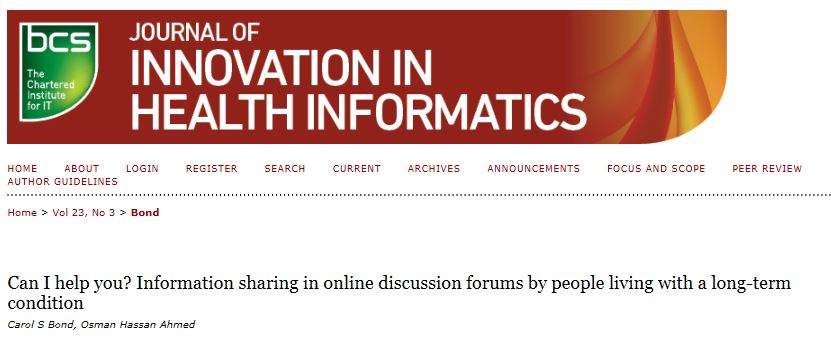
Congratulations to Dr. Carol Bond and Dr. Osman Ahmed in FHSS on the publication of their latest academic paper ‘Can I help you? Information sharing in online discussion forums by people living with a long-term condition’ [1]. Further congratulations are due to Osman who recently had three other papers accepted for publication [2-4].
Prof Edwin van Teijlingen
References:
- Bond, C., Ahmed, O., 2016. Can I help you? Information sharing in online discussion forums by people living with a long-term condition. Journal of Innovation in Health Informatics, 23 (3).
- West L.R., Griffin , S., Weiler, R., Ahmed,O. 2016 Management of concussion in disability sport: a different ball game? British Journal of Sports Medicine doi:10.1136/bjsports-2016-096767
- “Educating the masses: Suggestions for improving online concussion information via the mainstream media” in Concussion (not available online yet)
- “Do Neurocognitive SCAT3 Baseline Test Scores Differ Between Footballers (Soccer) Living With and Without Disability? A Cross-Sectional Study” in Clinical Journal of Sports Medicine (not yet available online)
RISE 2017 – slides now available
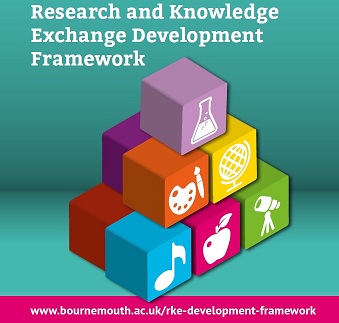 If you were unable to attend the session on 6/12/16 introducing the Horizon 2020 Research and Innovation Staff Exchange (RISE) call for 2017 and would still like to find out more, please go to the RKE Development Framework Community on MyBU to view the slides from this event. These are located within the International Funding pathway > Horizon 2020 Calls.
If you were unable to attend the session on 6/12/16 introducing the Horizon 2020 Research and Innovation Staff Exchange (RISE) call for 2017 and would still like to find out more, please go to the RKE Development Framework Community on MyBU to view the slides from this event. These are located within the International Funding pathway > Horizon 2020 Calls.
Please note that it is imperative that you contact Emily Cieciura, RKEO’s Research Facilitator: EU & International, before starting work on any application to this call.
U3A are looking for speakers – could you help?
The Bournemouth chapter of the University of the Third Age (U3A) are seeking a speaker for their monthly meetings. Talks can be around anything, although they’ve requested nothing overly controversial, and will need to be 45 minutes to an hour including 15 minutes for questions. If you’d be interested in speaking then please email me – nkay@bournemouth.ac.uk with a brief summary of what you’d like to talk about. I’ll forward all names and descriptions I receive by Thursday 8th Dec at 4pm onto their chapter lead for her to select which talks they would like.
The U3A is a fantastically engaged audience and this is a great opportunity to get involved in some public engagement with a ready made audience.
HSS staff achieve eHealth publication
Dr Carol Bond (Principal Academic Digital Health) and Dr Osman Ahmed (Lecturer in Physiotherapy) have recently had their work on online health information sharing published in the Journal of Innovation in Health Informatics.
Building upon their prior work on online communities, this study took a qualitative approach to explore the information shared by online discussion boards and how users shared this information. The study used diabetes forums as an exam, with key findings showing that much of the information sharing came from experience (including sharing their experiences from interactions with healthcare professionals). Drs Bond and Ahmed are now developing this work further by exploring similar patterns using other social media platforms (Twitter, Facebook, etc).
This paper is available online at:
https://hijournal.bcs.org/index.php/jhi/article/view/853
Bond, CS; Ahmed, OH. Can I help you? Information sharing in online discussion forums by people living with a long-term condition. Journal of Innovation in Health Informatics, 2016;23(3):620-626.
BU Physio makes it into Frontline!
Congratulations go to Debbie Neal, physiotherapy lecturer in HSS, for her recent appearance in the Frontline Journal (the professional magazine of the Chartered Society of Physiotherapy). Debbie was interviewed in relation to her post as the training and evaluation lead for the South Somerset Symphony programme. The article is also available online at:
http://www.csp.org.uk/frontline/article/leadership-taking-flight
We are fortunate enough to have someone as experienced as Debbie within our team here at BU, and its great that her leadership role is being recognised by Frontline!
Bournemouth University researchers awarded major new research council grant to explore Paralympic coverage

“How people with disabilities are treated in everyday life is influenced by the way that they’re portrayed in the media, but there is very little evidence to explain exactly how the visibility of para-sport athletes makes a difference to the everyday lives of people with disabilities,” explains Professor Silk, “There is a need to find out how para-sport broadcasts are put together and what audiences think of such coverage. This can help us to understand how such coverage changes the way people with disabilities are treated and perceived.”
The project builds on previous research conducted at Bournemouth that explored the way athletes with disabilities were represented in the media during the 2012 Paralympic Games. This coverage celebrated athletes for their achievements as ‘super humans’. Subsequent research questions the narrative of para-athletes as ‘super-humans’ and suggests that many people with disabilities largely didn’t benefit from the legacy of the Games.”
“The coverage of the last two Paralympic Games has certainly elevated the visibility of certain types of disability,” continues Professor Silk, “and this might open the door to potential social change. Despite this, much work is needed to better understand the ways in which athletes are presented in the media and the very real barriers faced by people with disabilities when participating in everyday life.”
“To find out more about the role of Paralympic coverage in everyday life, the research addresses how different audiences make sense of this coverage. We’ll also be analysing broadcast coverage of this year’s Paralympics and talking to staff from Channel 4 – the UK’s official Paralympic broadcaster and a project partner on this research. We want to find out more about their editorial decision-making process. We’ll be sharing our findings through an exhibition and full-length documentary.”
“We’re going to be working with a wide range of people and organisations – Paralympics GB, former Paralympians, disability artists and activists to name just a few – to develop recommendations that will impact future coverage of para-sport. We want to influence para-sport coverage so that it’s inclusive, stereotype-free and makes a difference to the daily lives of people with disabilities. Ultimately we hope that our project will help to positively influence the way that para-athletes are portrayed through Paralympic broadcasts across the world.”












 BU paper among top 20 most cited papers
BU paper among top 20 most cited papers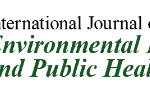 Nepal migrant workers returning from India
Nepal migrant workers returning from India New BU midwifery publication
New BU midwifery publication MSCA Postdoctoral Fellowships 2025 Call
MSCA Postdoctoral Fellowships 2025 Call ERC Advanced Grant 2025 Webinar
ERC Advanced Grant 2025 Webinar Horizon Europe Work Programme 2025 Published
Horizon Europe Work Programme 2025 Published Horizon Europe 2025 Work Programme pre-Published
Horizon Europe 2025 Work Programme pre-Published Update on UKRO services
Update on UKRO services European research project exploring use of ‘virtual twins’ to better manage metabolic associated fatty liver disease
European research project exploring use of ‘virtual twins’ to better manage metabolic associated fatty liver disease